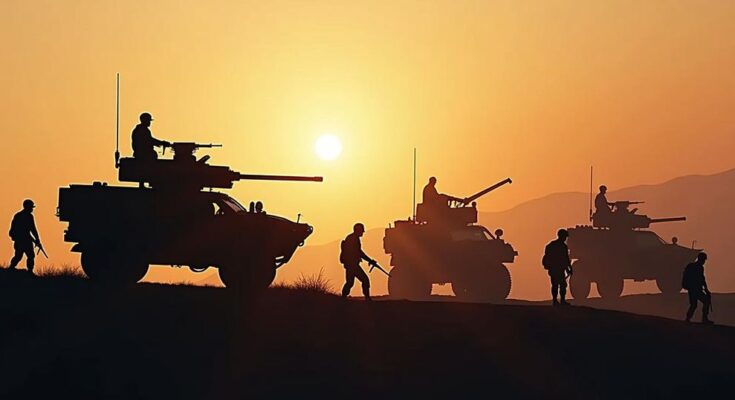Israeli troops are engaged in battles with Hezbollah in Lebanon following an Iranian missile strike that targeted Israel. This missile assault escalated an already volatile situation, prompting military operations from both sides, with significant casualties reported. The conflict, fueled by historical animosities, now risks drawing in larger regional powers, notably Iran and the United States, amidst fears of a widespread war.
Israeli forces are engaged in combat with Hezbollah militants in Lebanon amid escalating tensions following a missile attack from Iran that targeted Israel. On a recent Tuesday, Iran unleashed approximately 180 missiles into Israeli territory, heightening concerns of a broader regional conflict. The Israeli military intercepted many of the projectiles, with air raid sirens sounding across the nation, prompting citizens to seek shelter. In Tehran, supporters publicly celebrated the missile assault, chanting anti-Israel slogans and displaying flags from Iran and Hezbollah. The situation intensified as explosions were reported in Beirut, where Israel confirmed it was targeting Hezbollah strongholds in retaliation for the missile launch. Israeli Prime Minister Benjamin Netanyahu declared that Iran would face consequences for its recent attacks, stating, “Iran made a big mistake tonight and it will pay for it.” This escalation comes during a tumultuous period that has seen ongoing violence in Gaza, where Israeli air and ground operations have resulted in significant casualties, particularly among civilians. Numerous Palestinians died during Israeli strikes in the Khan Younis district, with reports indicating extensive destruction across the area. Hezbollah has confirmed clashes between its fighters and Israeli troops near the border, and the Israeli military has stated that at least one Israeli soldier died in combat, marking the first reported casualty since renewed military operations commenced. Amid heavy military maneuvers, the Israeli armed forces have significant numbers of troops and artillery stationed along the Lebanon border, urging residents in vulnerable areas to evacuate as the threat of escalation looms. Over the past two weeks, Israeli airstrikes have reportedly killed over 1,000 people in Lebanon, including women and children. Meanwhile, the United Nations Secretary-General António Guterres faced backlash from Israel after calling for an immediate cease-fire and condemning the ongoing conflict, resulting in Israel declaring him persona non grata. As military operations unfold on multiple fronts, fears of a wider war involving regional powers are palpable, especially given Iran’s vocal support for both Hezbollah and Hamas, further complicating the geopolitical landscape.
The conflict between Israel and Iran, along with their proxies such as Hezbollah and Hamas, has deep historical roots stemming from territorial disputes, political differences, and religious tensions. The recent uptick in violence can be traced back to the declaration of war by Hamas against Israel in October 2023, which resulted in significant casualties and military responses from the Israeli government. Iran’s involvement was marked by its support of militant groups, leading to retaliatory strikes from Israel against both Iranian military interests and those of its affiliates in Lebanon and Gaza. The ongoing hostilities threaten to escalate into a wider regional confrontation involving various stakeholders, including the United States, which has increased its military presence in the area.
The situation in the Middle East continues to deteriorate, with Israeli forces active in Lebanon against Hezbollah and responding to Iranian missile attacks. The toll of violence in Gaza remains alarmingly high, highlighting the humanitarian crises that accompany such military engagements. As Israel prepares for further confrontations, the international community watches closely, particularly regarding potential escalations involving Iranian military support for its allies.
Original Source: apnews.com




